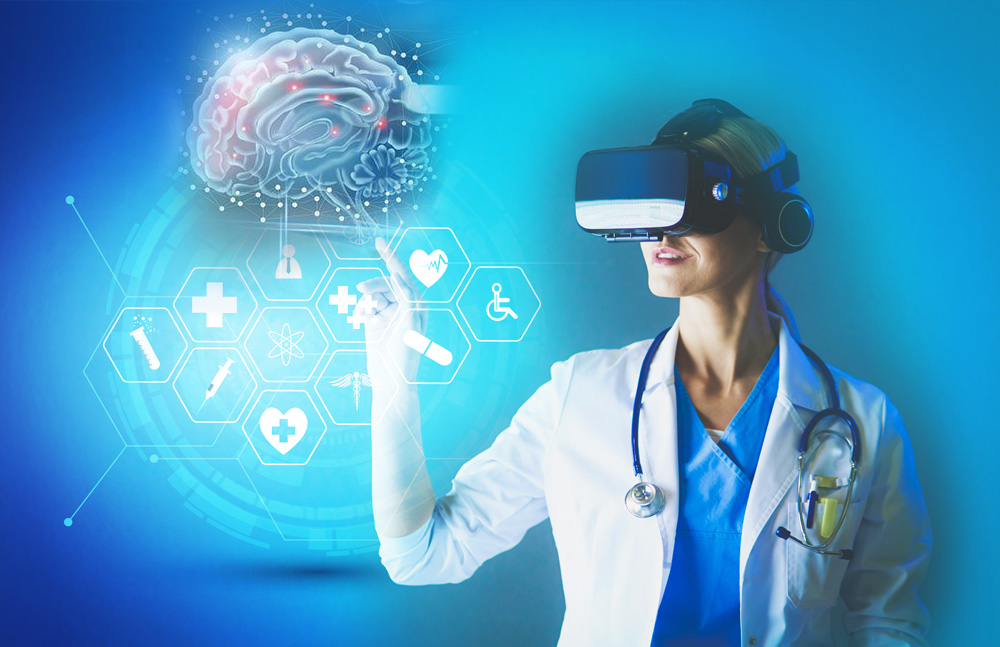Artificial intelligence (AI) is revolutionizing the healthcare industry, bringing forth a new era of advanced diagnostics, personalized treatments, and improved patient care.
By harnessing the power of AI, healthcare professionals can analyze vast amounts of data, uncover patterns, and make data-driven predictions.
In this blog post, we will delve into the world of AI in healthcare, exploring its applications, benefits, challenges, and future prospects.
Understanding Artificial Intelligence in Healthcare
1. Defining Artificial Intelligence
Artificial intelligence refers to the simulation of human intelligence in machines, enabling them to perform tasks that typically require human intelligence. In healthcare, AI systems can analyze complex medical data, identify patterns, and make accurate predictions. This ability to process and interpret large volumes of data quickly is a hallmark of AI and forms the foundation of its applications in the healthcare sector.
2. Applications of Artificial Intelligence in Healthcare
AI is transforming various aspects of healthcare delivery, revolutionizing the industry in the following ways:
Diagnostic Imaging and Radiology
AI algorithms can analyze medical images, such as X-rays, MRIs, and CT scans, to assist radiologists in identifying anomalies and making accurate diagnoses. This technology enhances the accuracy of diagnoses, reduces the chances of misinterpretation, and enables early detection of diseases.
Drug Discovery and Development
AI is being utilized in drug discovery to identify potential drug candidates more efficiently. By analyzing vast databases of molecular information, AI algorithms can identify patterns, predict drug efficacy, and even simulate drug interactions. This streamlines the drug discovery process and accelerates the development of new treatments.
Virtual Nursing Assistants and Chatbots
AI-powered virtual nursing assistants and chatbots provide round-the-clock support to patients by answering questions, offering medical advice, and monitoring symptoms. These intelligent systems enhance patient engagement, provide timely information, and alleviate the burden on healthcare providers.
Predictive Analytics for Disease Management
AI algorithms can analyze patient data, such as electronic health records and genetic information, to predict the likelihood of developing certain diseases. This enables healthcare professionals to intervene early, initiate preventive measures, and effectively manage chronic conditions.
Precision Medicine and Personalized Treatment
AI helps tailor treatment plans to individual patients by analyzing genetic data, medical history, and other relevant factors. This personalized approach improves treatment outcomes, minimizes adverse effects, and optimizes patient care.
Administrative Tasks Automation
AI powered healthcare platform, streamlines administrative tasks, such as appointment scheduling, billing, and documentation, reducing the administrative burden on healthcare providers. This allows them to focus more on patient care and improves overall efficiency.
Patient Monitoring and Remote Care
AI-powered wearables and remote monitoring devices enable continuous tracking of patient health metrics, such as heart rate, blood pressure, and glucose levels. This technology facilitates early detection of abnormalities, allows for remote patient management, and improves patient outcomes.
3. Benefits of Artificial Intelligence in Healthcare
The integration of AI in healthcare brings numerous benefits that positively impact both patients and healthcare providers:
- Improved Diagnostic Accuracy and Early Detection of Diseases: AI systems enhance the accuracy of diagnoses by analyzing medical images and patient data, leading to early detection of diseases and timely interventions.
- Enhanced Efficiency and Automation of Time-consuming Tasks: AI automates administrative tasks, reduces paperwork, and streamlines processes, freeing up healthcare providers’ time for patient care.
- Personalized Treatment Plans Tailored to Individual Patients: AI analyzes patient data to develop personalized treatment plans, taking into account genetic information, medical history, and other relevant factors. This approach improves treatment outcomes and patient satisfaction.
- Predictive Analytics for Better Disease Management and Prevention: AI algorithms can predict disease progression and identify high-risk individuals, enabling healthcare professionals to implement preventive measures and manage chronic conditions more effectively.
- Streamlined Administrative Processes for Healthcare Providers: AI automates administrative tasks, such as appointment scheduling and billing, reducing errors and improving efficiency in healthcare facilities.
- Increased Accessibility to Healthcare Services through Telemedicine and Remote Monitoring: AI-powered telemedicine platforms and remote monitoring devices facilitate access to healthcare services for patients in remote areas or with limited mobility. This technology enables remote consultations, continuous monitoring, and timely interventions.
4. Challenges and Considerations
While AI presents significant opportunities in healthcare, it also poses several challenges and considerations:
- Ethical Implications: The use of AI raises ethical concerns regarding patient privacy, data security, and the potential for bias in decision-making algorithms. It is essential to establish robust ethical frameworks to address these concerns.
- Impact on the Healthcare Workforce: The integration of AI may lead to concerns about job displacement for healthcare professionals. However, AI should be seen as a tool to augment healthcare providers’ capabilities rather than replace them. Proper training and collaboration between AI experts and healthcare professionals are crucial for successful implementation.
- Regulatory Frameworks: To ensure the responsible and safe use of AI in healthcare, regulatory frameworks need to be established. These frameworks should address issues such as data privacy, algorithm transparency, and accountability.
5. Future Prospects and Conclusion
The future of AI in healthcare holds immense potential for advancements and transformative changes. As AI technologies continue to evolve, they will become more sophisticated, accurate, and accessible. Interdisciplinary collaboration between healthcare professionals and AI experts will be vital in unlocking the full potential of AI in improving patient outcomes, advancing medical research, and revolutionizing healthcare delivery.

Leave a comment